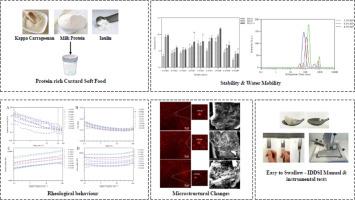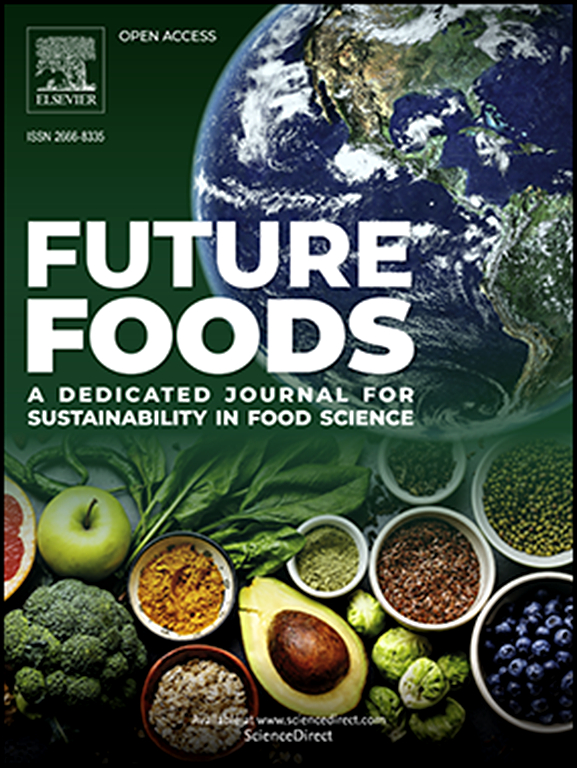为有吞咽困难的老年人配制富含蛋白质的奶油冻状软食并确定其特性
IF 8.2
Q1 FOOD SCIENCE & TECHNOLOGY
引用次数: 0
摘要
老年人普遍存在吞咽困难,需要通过软质食品摄入大量蛋白质。这项研究为吞咽困难的老年人开发了富含蛋白质的吉士型软食,并评估了牛奶蛋白质含量(3.9% 至 8.9%)对配方理化性质的影响。配方中加入了卡帕卡拉胶和菊粉作为增稠剂和膳食纤维。使用质构分析仪和流变仪测量了质构和流变特性,包括粘度、硬度和抗变形能力,以便与国际易吞咽食品标准进行比较。用扫描电子显微镜(SEM)和激光共聚焦扫描显微镜(CLSM)观察了影响吉士酱吞咽便利性的微观结构。结果表明,随着卡帕卡拉胶、菊粉和牛奶蛋白含量的增加,凝胶强度、粘度、抗变形能力和储存稳定性都有所提高。使用国际吞咽困难饮食标准化倡议(IDDSI)的叉压和勺子倾斜测试对配方的吞咽性进行了测试,将产品归类为 6 级--软&;一口大小的食品。工具性 IDDSI 叉压测试为优化配方提供了可靠的数据。结果表明,含有 0.7 % 卡帕卡拉胶、2.4 % 菊粉和 8.9 % 牛奶蛋白的吉士配方最佳。这项研究为为吞咽困难的老年人开发高蛋白软食提供了启示。本文章由计算机程序翻译,如有差异,请以英文原文为准。

Formulation and characterisation of protein-rich custard-like soft food intended for the elderly with swallowing difficulties
Swallowing problem is prevalent in the elderly which requires high intake of protein through soft foods. This study developed protein-rich custard-type soft foods for elderly with dysphagia and evaluated the impact of milk protein content (3.9 % to 8.9 %) on the physicochemical properties of the formulations. Kappa-carrageenan and inulin were incorporated as a thickener and dietary fibre. Textural and rheological characteristics including viscosity, hardness, and deformation resistance, were measured using texture analyser and rheometer to compare with international standards for swallowing-friendly foods. The microstructure was visualised by scanning electron microscopy (SEM) and confocal laser scanning microscopy (CLSM), which influenced custard's ease of swallowing. Results showed that the increasing kappa-carrageenan, inulin, and milk protein content increased the gel strength, viscosity, resistance to deformation and storage stability. The swallowability of the formulations was tested using the International Dysphagia Diet Standardization Initiative's (IDDSI) fork pressure and spoon tilt tests, classifying the products as Level 6 – Soft & Bite-Sized Foods. The instrumental IDDSI fork pressure test generated reliable data to optimise formulations. The custard formulation containing 0.7 % kappa-carrageenan, 2.4 % inulin, and 8.9 % milk protein was found to be optimal. This work provides insights for developing high-protein soft foods for the elderly with swallowing difficulties.
求助全文
通过发布文献求助,成功后即可免费获取论文全文。
去求助
来源期刊

Future Foods
Agricultural and Biological Sciences-Food Science
CiteScore
8.60
自引率
0.00%
发文量
97
审稿时长
15 weeks
期刊介绍:
Future Foods is a specialized journal that is dedicated to tackling the challenges posed by climate change and the need for sustainability in the realm of food production. The journal recognizes the imperative to transform current food manufacturing and consumption practices to meet the dietary needs of a burgeoning global population while simultaneously curbing environmental degradation.
The mission of Future Foods is to disseminate research that aligns with the goal of fostering the development of innovative technologies and alternative food sources to establish more sustainable food systems. The journal is committed to publishing high-quality, peer-reviewed articles that contribute to the advancement of sustainable food practices.
Abstracting and indexing:
Scopus
Directory of Open Access Journals (DOAJ)
Emerging Sources Citation Index (ESCI)
SCImago Journal Rank (SJR)
SNIP
 求助内容:
求助内容: 应助结果提醒方式:
应助结果提醒方式:


